Auditing Principles
VerifiedAdded on 2023/06/04
|16
|3794
|410
AI Summary
This essay discusses the impact of the Royal Commission in Australia on the banking/financial sector. It identifies the main purpose of the Royal Commission and the reasons and resistance to the Royal Commission in Australia. The essay helps in understanding the importance of governance (Royal Commission) in the banking/financial sector.
Contribute Materials
Your contribution can guide someone’s learning journey. Share your
documents today.
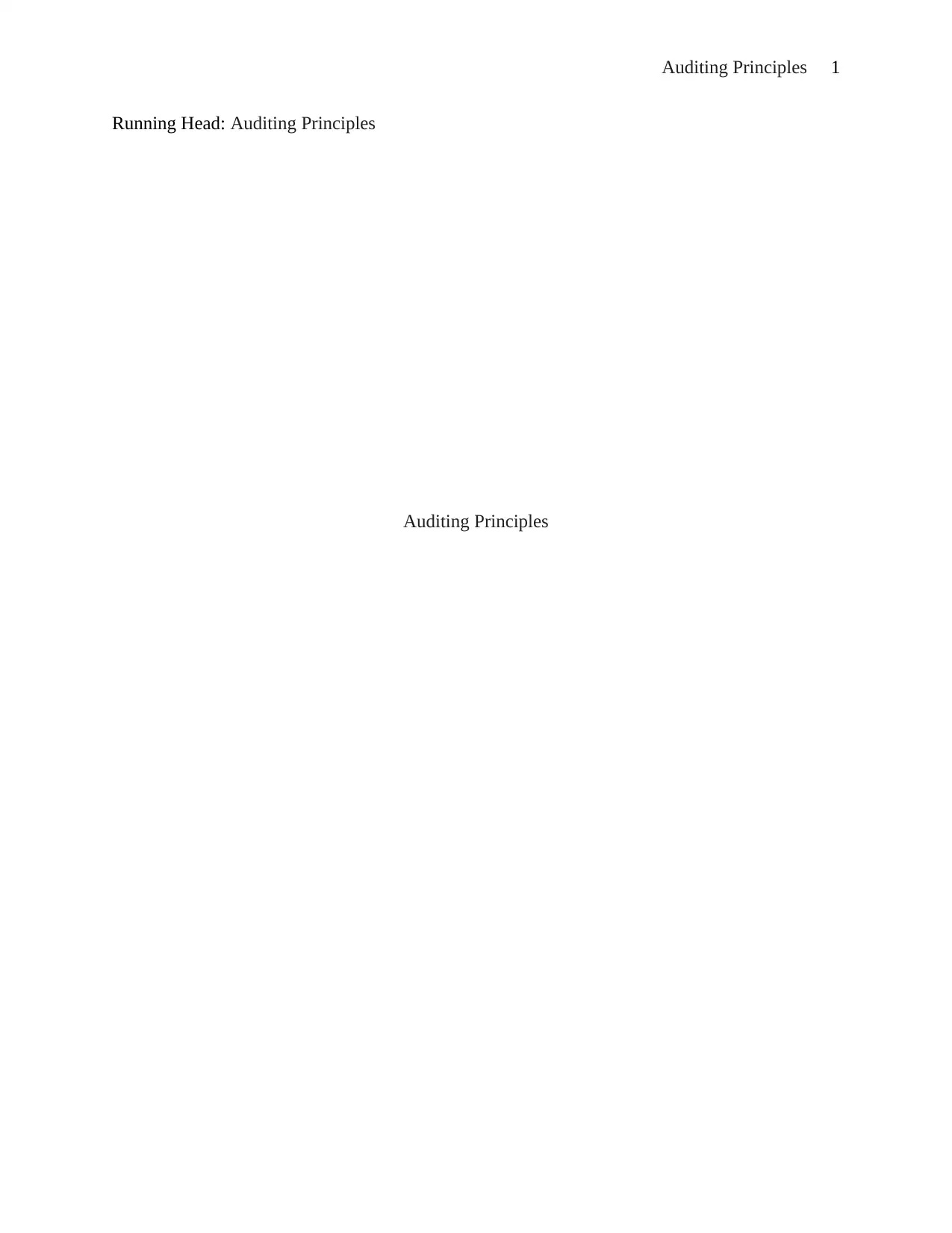
Auditing Principles 1
Running Head: Auditing Principles
Auditing Principles
Running Head: Auditing Principles
Auditing Principles
Secure Best Marks with AI Grader
Need help grading? Try our AI Grader for instant feedback on your assignments.
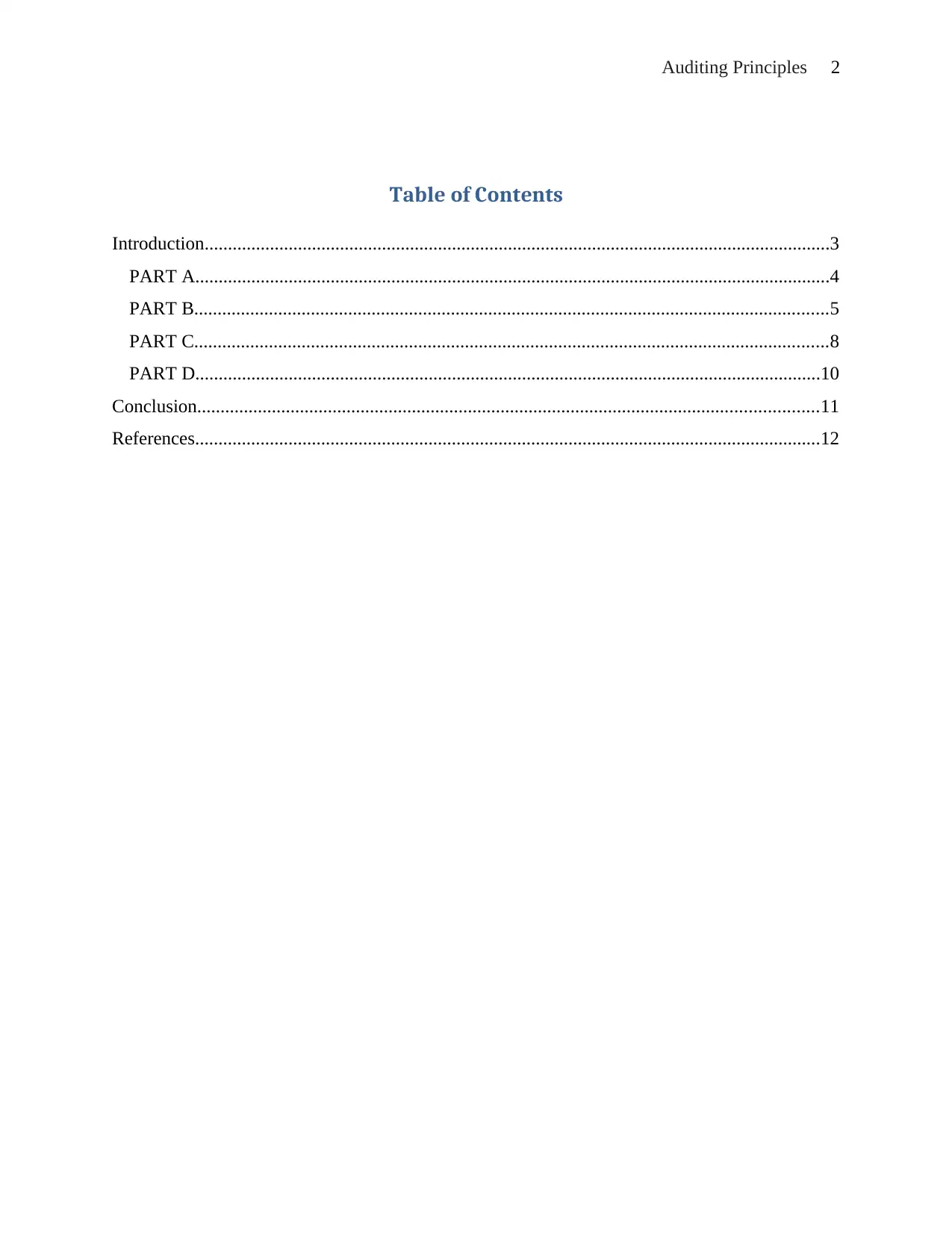
Auditing Principles 2
Table of Contents
Introduction......................................................................................................................................3
PART A........................................................................................................................................4
PART B........................................................................................................................................5
PART C........................................................................................................................................8
PART D......................................................................................................................................10
Conclusion.....................................................................................................................................11
References......................................................................................................................................12
Table of Contents
Introduction......................................................................................................................................3
PART A........................................................................................................................................4
PART B........................................................................................................................................5
PART C........................................................................................................................................8
PART D......................................................................................................................................10
Conclusion.....................................................................................................................................11
References......................................................................................................................................12
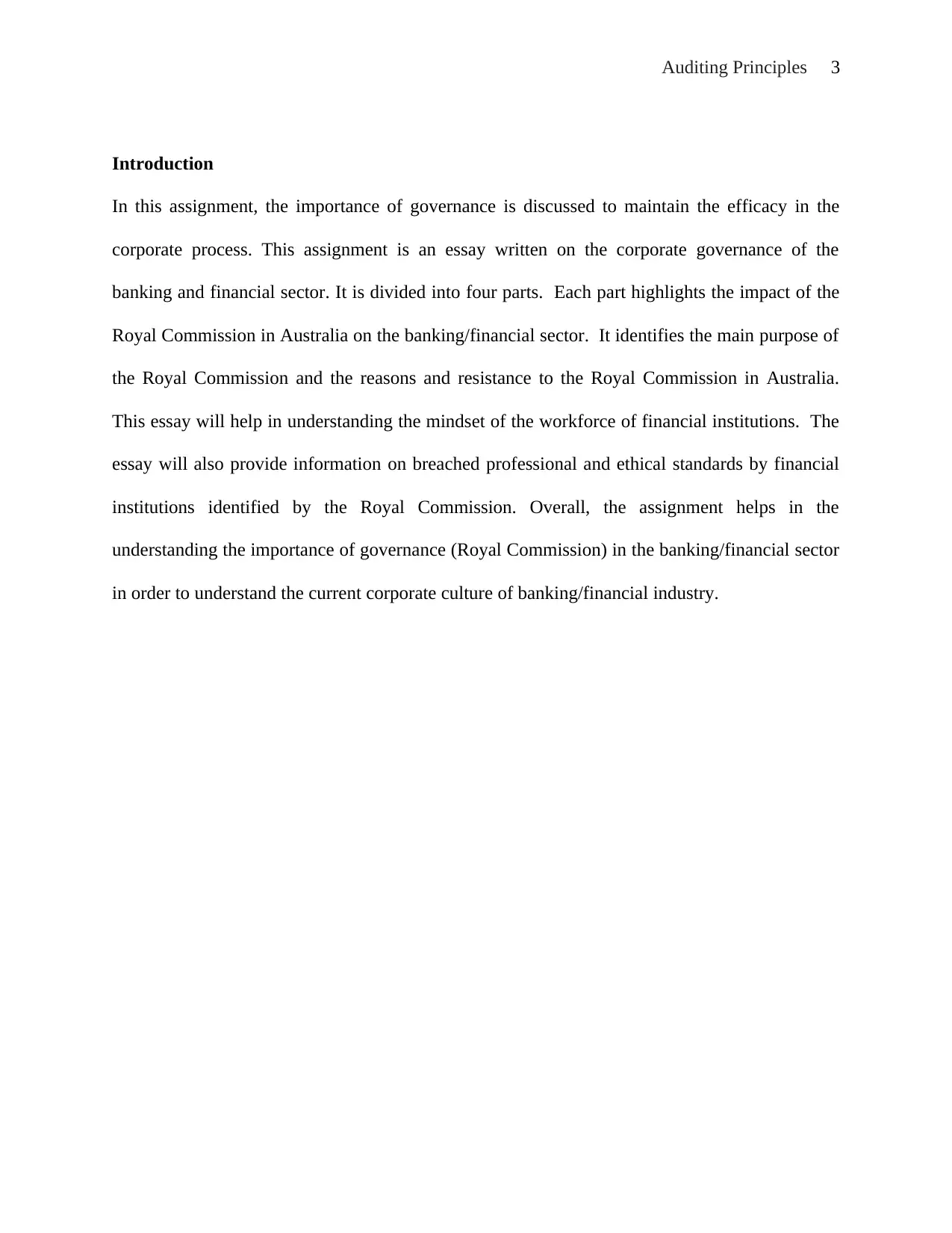
Auditing Principles 3
Introduction
In this assignment, the importance of governance is discussed to maintain the efficacy in the
corporate process. This assignment is an essay written on the corporate governance of the
banking and financial sector. It is divided into four parts. Each part highlights the impact of the
Royal Commission in Australia on the banking/financial sector. It identifies the main purpose of
the Royal Commission and the reasons and resistance to the Royal Commission in Australia.
This essay will help in understanding the mindset of the workforce of financial institutions. The
essay will also provide information on breached professional and ethical standards by financial
institutions identified by the Royal Commission. Overall, the assignment helps in the
understanding the importance of governance (Royal Commission) in the banking/financial sector
in order to understand the current corporate culture of banking/financial industry.
Introduction
In this assignment, the importance of governance is discussed to maintain the efficacy in the
corporate process. This assignment is an essay written on the corporate governance of the
banking and financial sector. It is divided into four parts. Each part highlights the impact of the
Royal Commission in Australia on the banking/financial sector. It identifies the main purpose of
the Royal Commission and the reasons and resistance to the Royal Commission in Australia.
This essay will help in understanding the mindset of the workforce of financial institutions. The
essay will also provide information on breached professional and ethical standards by financial
institutions identified by the Royal Commission. Overall, the assignment helps in the
understanding the importance of governance (Royal Commission) in the banking/financial sector
in order to understand the current corporate culture of banking/financial industry.
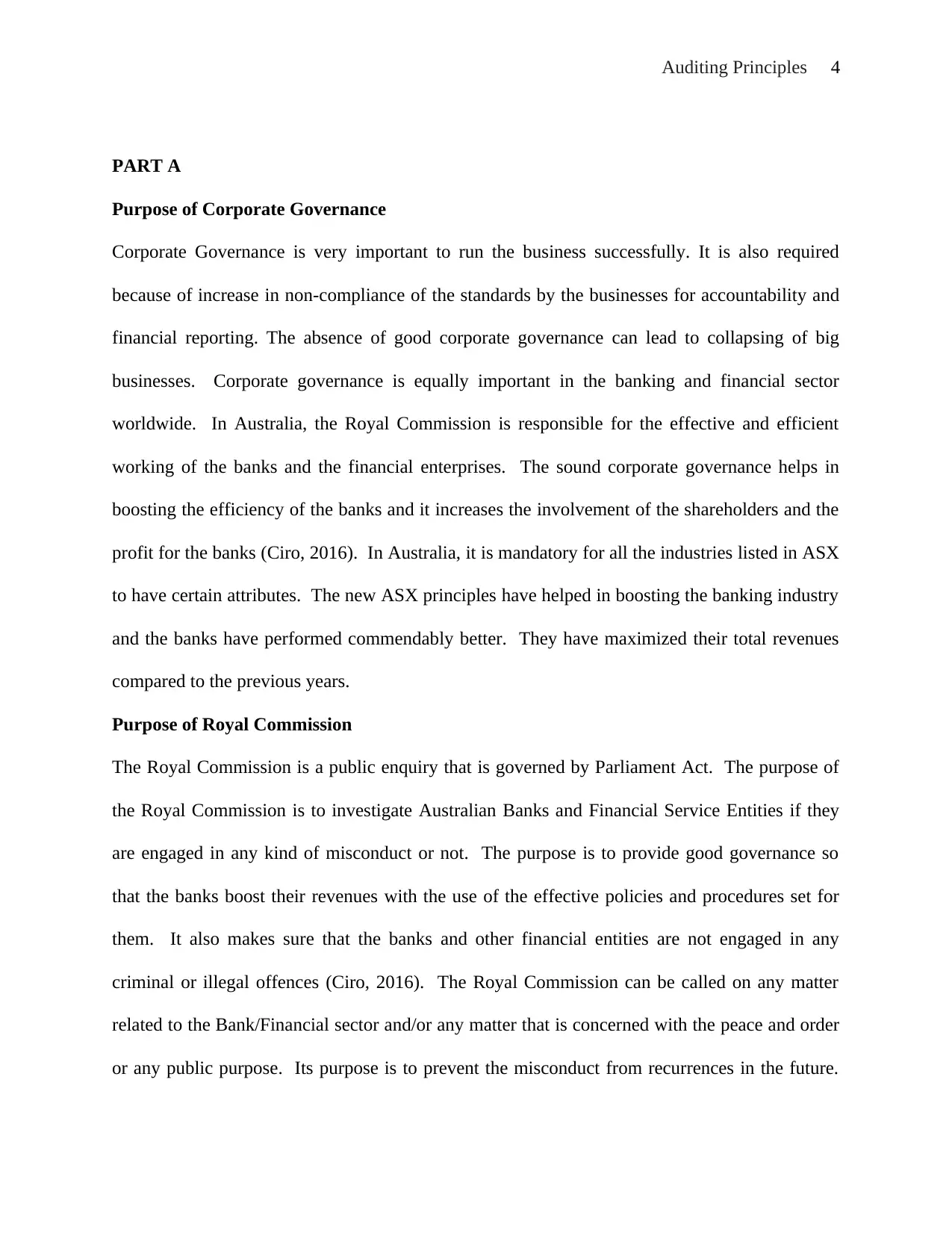
Auditing Principles 4
PART A
Purpose of Corporate Governance
Corporate Governance is very important to run the business successfully. It is also required
because of increase in non-compliance of the standards by the businesses for accountability and
financial reporting. The absence of good corporate governance can lead to collapsing of big
businesses. Corporate governance is equally important in the banking and financial sector
worldwide. In Australia, the Royal Commission is responsible for the effective and efficient
working of the banks and the financial enterprises. The sound corporate governance helps in
boosting the efficiency of the banks and it increases the involvement of the shareholders and the
profit for the banks (Ciro, 2016). In Australia, it is mandatory for all the industries listed in ASX
to have certain attributes. The new ASX principles have helped in boosting the banking industry
and the banks have performed commendably better. They have maximized their total revenues
compared to the previous years.
Purpose of Royal Commission
The Royal Commission is a public enquiry that is governed by Parliament Act. The purpose of
the Royal Commission is to investigate Australian Banks and Financial Service Entities if they
are engaged in any kind of misconduct or not. The purpose is to provide good governance so
that the banks boost their revenues with the use of the effective policies and procedures set for
them. It also makes sure that the banks and other financial entities are not engaged in any
criminal or illegal offences (Ciro, 2016). The Royal Commission can be called on any matter
related to the Bank/Financial sector and/or any matter that is concerned with the peace and order
or any public purpose. Its purpose is to prevent the misconduct from recurrences in the future.
PART A
Purpose of Corporate Governance
Corporate Governance is very important to run the business successfully. It is also required
because of increase in non-compliance of the standards by the businesses for accountability and
financial reporting. The absence of good corporate governance can lead to collapsing of big
businesses. Corporate governance is equally important in the banking and financial sector
worldwide. In Australia, the Royal Commission is responsible for the effective and efficient
working of the banks and the financial enterprises. The sound corporate governance helps in
boosting the efficiency of the banks and it increases the involvement of the shareholders and the
profit for the banks (Ciro, 2016). In Australia, it is mandatory for all the industries listed in ASX
to have certain attributes. The new ASX principles have helped in boosting the banking industry
and the banks have performed commendably better. They have maximized their total revenues
compared to the previous years.
Purpose of Royal Commission
The Royal Commission is a public enquiry that is governed by Parliament Act. The purpose of
the Royal Commission is to investigate Australian Banks and Financial Service Entities if they
are engaged in any kind of misconduct or not. The purpose is to provide good governance so
that the banks boost their revenues with the use of the effective policies and procedures set for
them. It also makes sure that the banks and other financial entities are not engaged in any
criminal or illegal offences (Ciro, 2016). The Royal Commission can be called on any matter
related to the Bank/Financial sector and/or any matter that is concerned with the peace and order
or any public purpose. Its purpose is to prevent the misconduct from recurrences in the future.
Secure Best Marks with AI Grader
Need help grading? Try our AI Grader for instant feedback on your assignments.
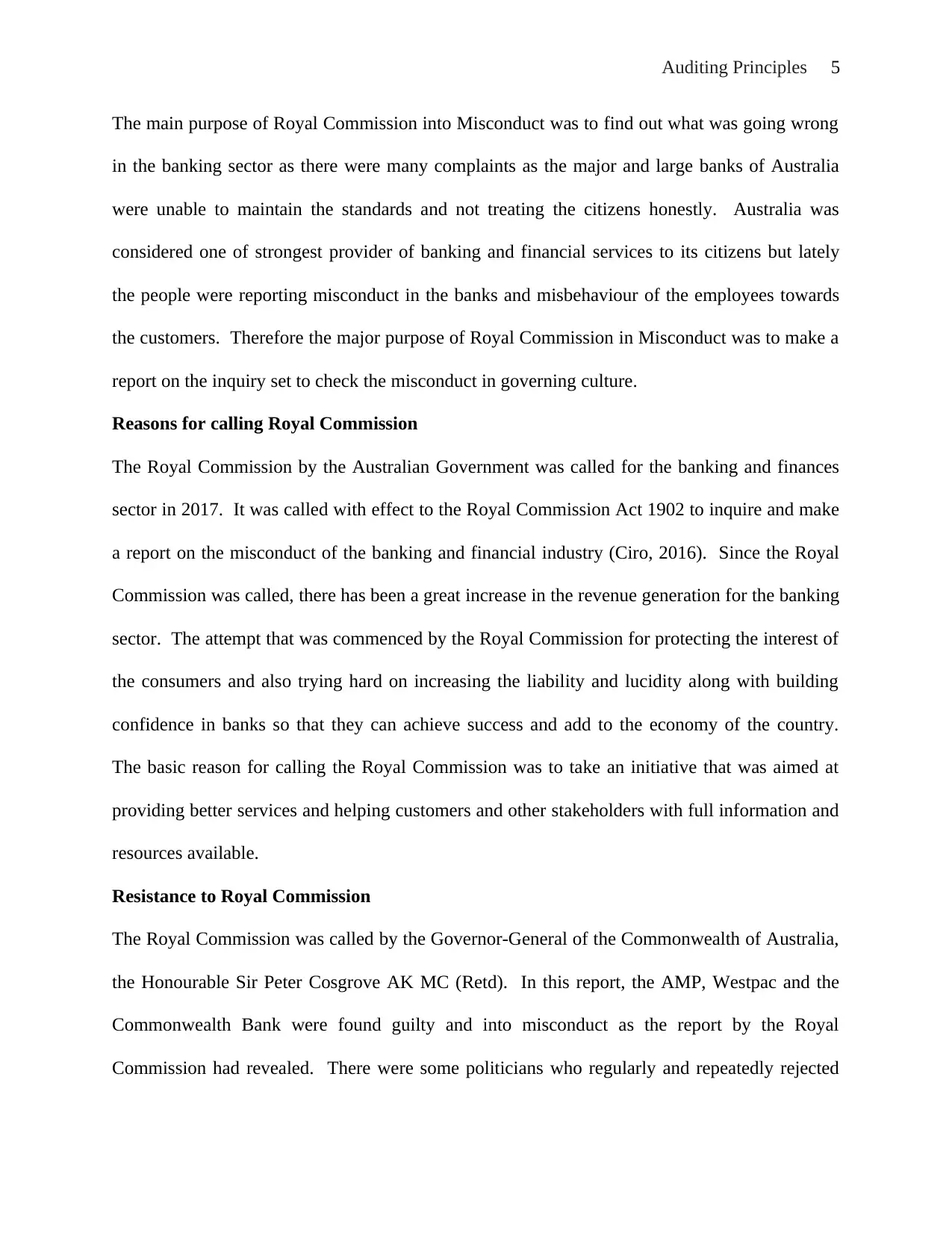
Auditing Principles 5
The main purpose of Royal Commission into Misconduct was to find out what was going wrong
in the banking sector as there were many complaints as the major and large banks of Australia
were unable to maintain the standards and not treating the citizens honestly. Australia was
considered one of strongest provider of banking and financial services to its citizens but lately
the people were reporting misconduct in the banks and misbehaviour of the employees towards
the customers. Therefore the major purpose of Royal Commission in Misconduct was to make a
report on the inquiry set to check the misconduct in governing culture.
Reasons for calling Royal Commission
The Royal Commission by the Australian Government was called for the banking and finances
sector in 2017. It was called with effect to the Royal Commission Act 1902 to inquire and make
a report on the misconduct of the banking and financial industry (Ciro, 2016). Since the Royal
Commission was called, there has been a great increase in the revenue generation for the banking
sector. The attempt that was commenced by the Royal Commission for protecting the interest of
the consumers and also trying hard on increasing the liability and lucidity along with building
confidence in banks so that they can achieve success and add to the economy of the country.
The basic reason for calling the Royal Commission was to take an initiative that was aimed at
providing better services and helping customers and other stakeholders with full information and
resources available.
Resistance to Royal Commission
The Royal Commission was called by the Governor-General of the Commonwealth of Australia,
the Honourable Sir Peter Cosgrove AK MC (Retd). In this report, the AMP, Westpac and the
Commonwealth Bank were found guilty and into misconduct as the report by the Royal
Commission had revealed. There were some politicians who regularly and repeatedly rejected
The main purpose of Royal Commission into Misconduct was to find out what was going wrong
in the banking sector as there were many complaints as the major and large banks of Australia
were unable to maintain the standards and not treating the citizens honestly. Australia was
considered one of strongest provider of banking and financial services to its citizens but lately
the people were reporting misconduct in the banks and misbehaviour of the employees towards
the customers. Therefore the major purpose of Royal Commission in Misconduct was to make a
report on the inquiry set to check the misconduct in governing culture.
Reasons for calling Royal Commission
The Royal Commission by the Australian Government was called for the banking and finances
sector in 2017. It was called with effect to the Royal Commission Act 1902 to inquire and make
a report on the misconduct of the banking and financial industry (Ciro, 2016). Since the Royal
Commission was called, there has been a great increase in the revenue generation for the banking
sector. The attempt that was commenced by the Royal Commission for protecting the interest of
the consumers and also trying hard on increasing the liability and lucidity along with building
confidence in banks so that they can achieve success and add to the economy of the country.
The basic reason for calling the Royal Commission was to take an initiative that was aimed at
providing better services and helping customers and other stakeholders with full information and
resources available.
Resistance to Royal Commission
The Royal Commission was called by the Governor-General of the Commonwealth of Australia,
the Honourable Sir Peter Cosgrove AK MC (Retd). In this report, the AMP, Westpac and the
Commonwealth Bank were found guilty and into misconduct as the report by the Royal
Commission had revealed. There were some politicians who regularly and repeatedly rejected
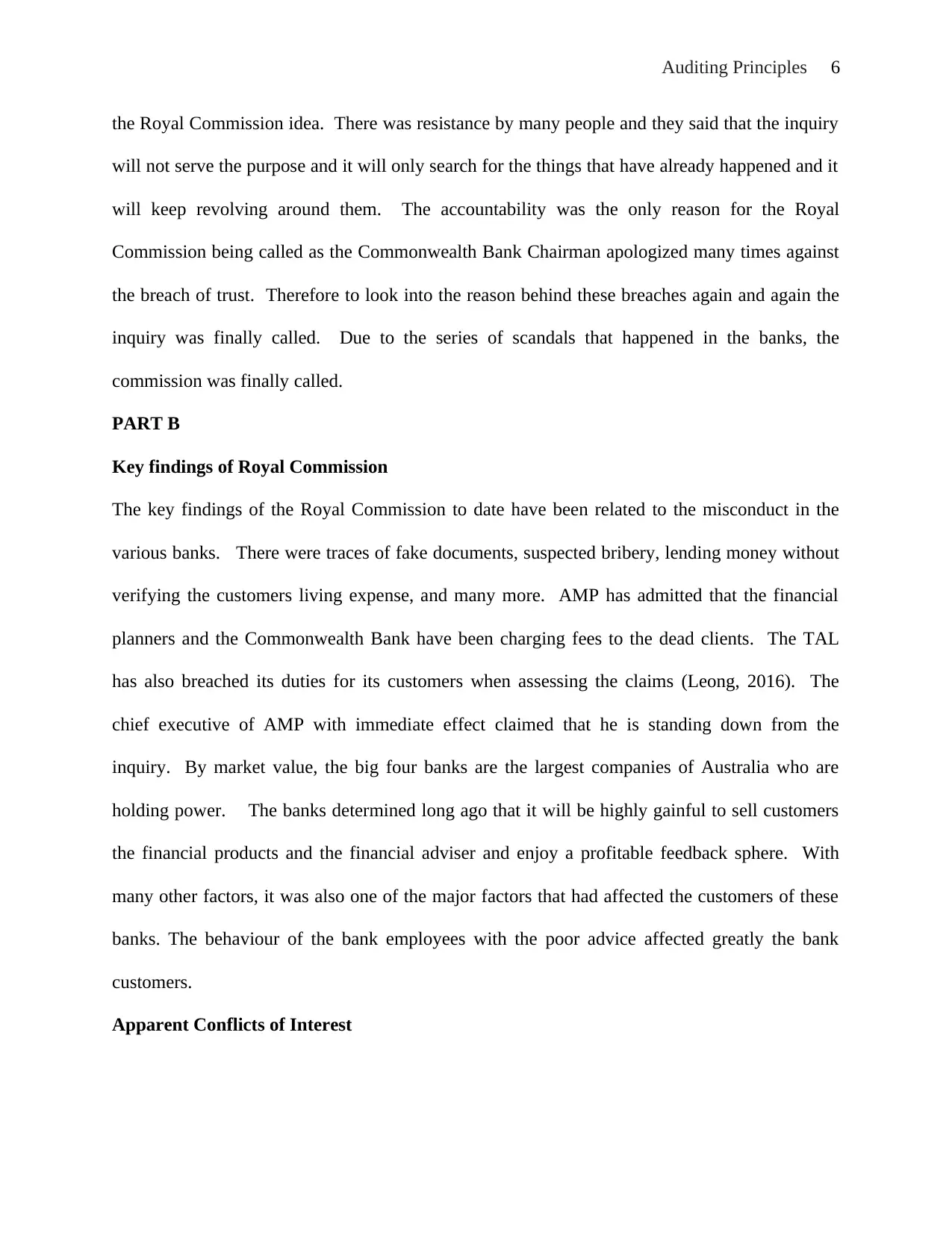
Auditing Principles 6
the Royal Commission idea. There was resistance by many people and they said that the inquiry
will not serve the purpose and it will only search for the things that have already happened and it
will keep revolving around them. The accountability was the only reason for the Royal
Commission being called as the Commonwealth Bank Chairman apologized many times against
the breach of trust. Therefore to look into the reason behind these breaches again and again the
inquiry was finally called. Due to the series of scandals that happened in the banks, the
commission was finally called.
PART B
Key findings of Royal Commission
The key findings of the Royal Commission to date have been related to the misconduct in the
various banks. There were traces of fake documents, suspected bribery, lending money without
verifying the customers living expense, and many more. AMP has admitted that the financial
planners and the Commonwealth Bank have been charging fees to the dead clients. The TAL
has also breached its duties for its customers when assessing the claims (Leong, 2016). The
chief executive of AMP with immediate effect claimed that he is standing down from the
inquiry. By market value, the big four banks are the largest companies of Australia who are
holding power. The banks determined long ago that it will be highly gainful to sell customers
the financial products and the financial adviser and enjoy a profitable feedback sphere. With
many other factors, it was also one of the major factors that had affected the customers of these
banks. The behaviour of the bank employees with the poor advice affected greatly the bank
customers.
Apparent Conflicts of Interest
the Royal Commission idea. There was resistance by many people and they said that the inquiry
will not serve the purpose and it will only search for the things that have already happened and it
will keep revolving around them. The accountability was the only reason for the Royal
Commission being called as the Commonwealth Bank Chairman apologized many times against
the breach of trust. Therefore to look into the reason behind these breaches again and again the
inquiry was finally called. Due to the series of scandals that happened in the banks, the
commission was finally called.
PART B
Key findings of Royal Commission
The key findings of the Royal Commission to date have been related to the misconduct in the
various banks. There were traces of fake documents, suspected bribery, lending money without
verifying the customers living expense, and many more. AMP has admitted that the financial
planners and the Commonwealth Bank have been charging fees to the dead clients. The TAL
has also breached its duties for its customers when assessing the claims (Leong, 2016). The
chief executive of AMP with immediate effect claimed that he is standing down from the
inquiry. By market value, the big four banks are the largest companies of Australia who are
holding power. The banks determined long ago that it will be highly gainful to sell customers
the financial products and the financial adviser and enjoy a profitable feedback sphere. With
many other factors, it was also one of the major factors that had affected the customers of these
banks. The behaviour of the bank employees with the poor advice affected greatly the bank
customers.
Apparent Conflicts of Interest
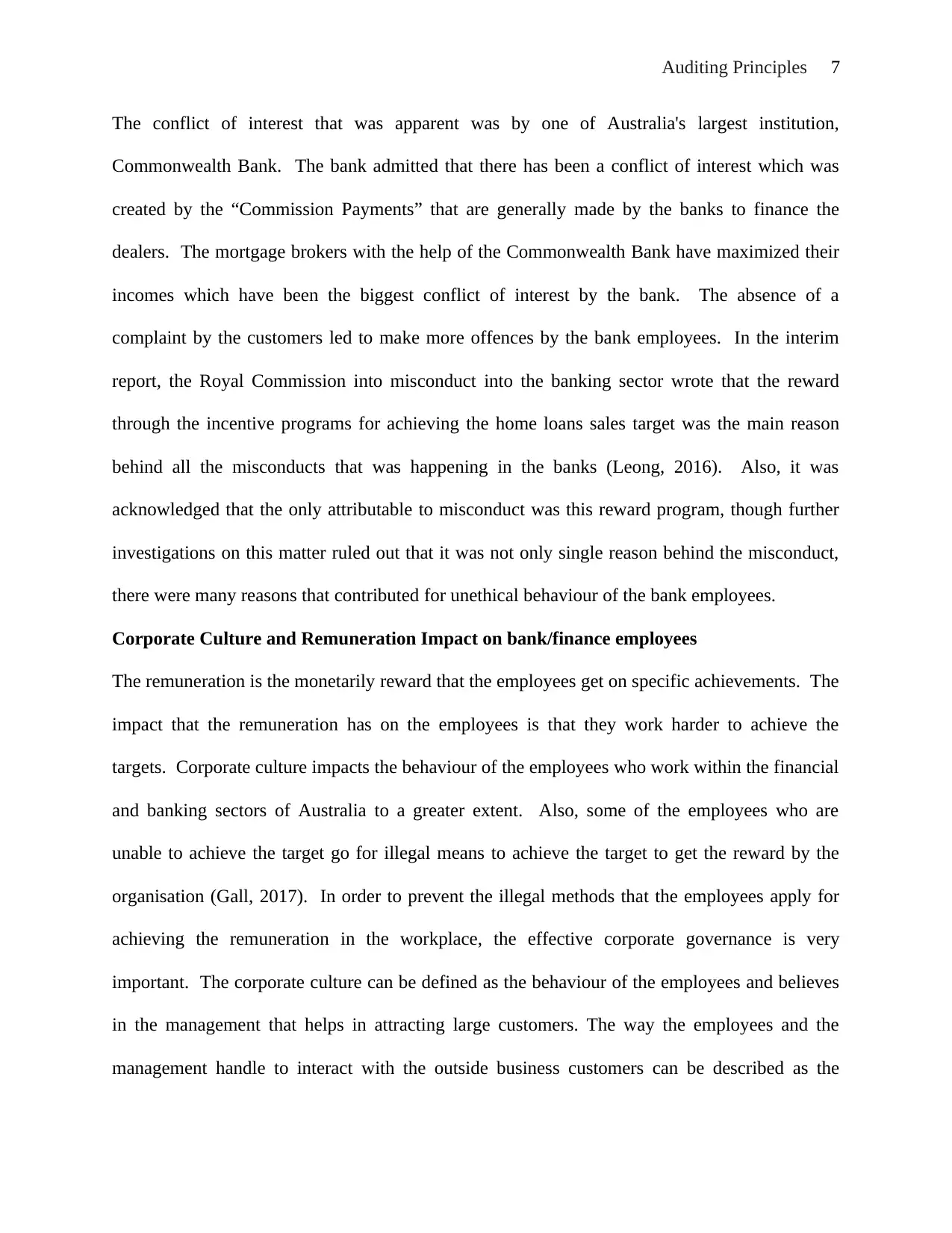
Auditing Principles 7
The conflict of interest that was apparent was by one of Australia's largest institution,
Commonwealth Bank. The bank admitted that there has been a conflict of interest which was
created by the “Commission Payments” that are generally made by the banks to finance the
dealers. The mortgage brokers with the help of the Commonwealth Bank have maximized their
incomes which have been the biggest conflict of interest by the bank. The absence of a
complaint by the customers led to make more offences by the bank employees. In the interim
report, the Royal Commission into misconduct into the banking sector wrote that the reward
through the incentive programs for achieving the home loans sales target was the main reason
behind all the misconducts that was happening in the banks (Leong, 2016). Also, it was
acknowledged that the only attributable to misconduct was this reward program, though further
investigations on this matter ruled out that it was not only single reason behind the misconduct,
there were many reasons that contributed for unethical behaviour of the bank employees.
Corporate Culture and Remuneration Impact on bank/finance employees
The remuneration is the monetarily reward that the employees get on specific achievements. The
impact that the remuneration has on the employees is that they work harder to achieve the
targets. Corporate culture impacts the behaviour of the employees who work within the financial
and banking sectors of Australia to a greater extent. Also, some of the employees who are
unable to achieve the target go for illegal means to achieve the target to get the reward by the
organisation (Gall, 2017). In order to prevent the illegal methods that the employees apply for
achieving the remuneration in the workplace, the effective corporate governance is very
important. The corporate culture can be defined as the behaviour of the employees and believes
in the management that helps in attracting large customers. The way the employees and the
management handle to interact with the outside business customers can be described as the
The conflict of interest that was apparent was by one of Australia's largest institution,
Commonwealth Bank. The bank admitted that there has been a conflict of interest which was
created by the “Commission Payments” that are generally made by the banks to finance the
dealers. The mortgage brokers with the help of the Commonwealth Bank have maximized their
incomes which have been the biggest conflict of interest by the bank. The absence of a
complaint by the customers led to make more offences by the bank employees. In the interim
report, the Royal Commission into misconduct into the banking sector wrote that the reward
through the incentive programs for achieving the home loans sales target was the main reason
behind all the misconducts that was happening in the banks (Leong, 2016). Also, it was
acknowledged that the only attributable to misconduct was this reward program, though further
investigations on this matter ruled out that it was not only single reason behind the misconduct,
there were many reasons that contributed for unethical behaviour of the bank employees.
Corporate Culture and Remuneration Impact on bank/finance employees
The remuneration is the monetarily reward that the employees get on specific achievements. The
impact that the remuneration has on the employees is that they work harder to achieve the
targets. Corporate culture impacts the behaviour of the employees who work within the financial
and banking sectors of Australia to a greater extent. Also, some of the employees who are
unable to achieve the target go for illegal means to achieve the target to get the reward by the
organisation (Gall, 2017). In order to prevent the illegal methods that the employees apply for
achieving the remuneration in the workplace, the effective corporate governance is very
important. The corporate culture can be defined as the behaviour of the employees and believes
in the management that helps in attracting large customers. The way the employees and the
management handle to interact with the outside business customers can be described as the
Paraphrase This Document
Need a fresh take? Get an instant paraphrase of this document with our AI Paraphraser
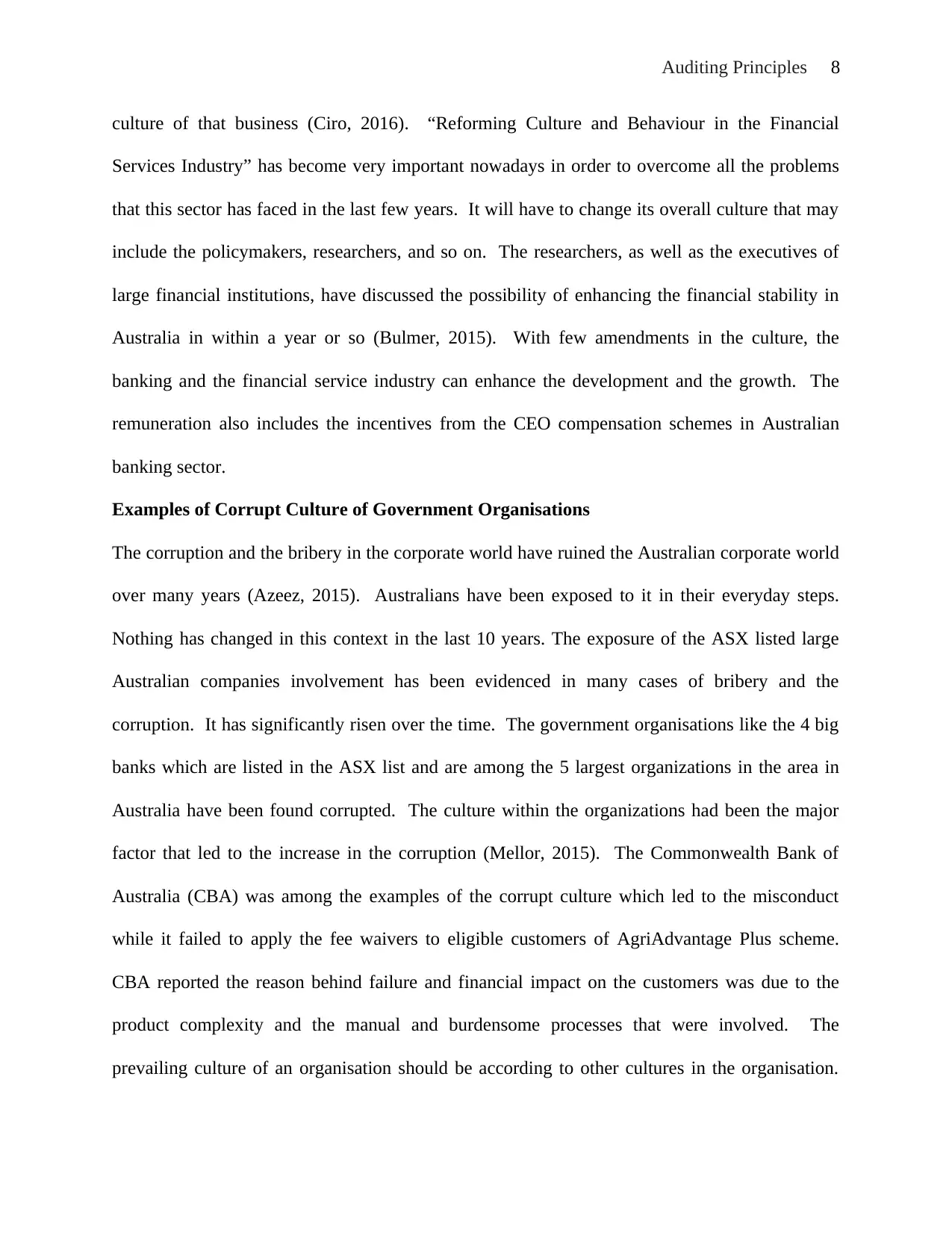
Auditing Principles 8
culture of that business (Ciro, 2016). “Reforming Culture and Behaviour in the Financial
Services Industry” has become very important nowadays in order to overcome all the problems
that this sector has faced in the last few years. It will have to change its overall culture that may
include the policymakers, researchers, and so on. The researchers, as well as the executives of
large financial institutions, have discussed the possibility of enhancing the financial stability in
Australia in within a year or so (Bulmer, 2015). With few amendments in the culture, the
banking and the financial service industry can enhance the development and the growth. The
remuneration also includes the incentives from the CEO compensation schemes in Australian
banking sector.
Examples of Corrupt Culture of Government Organisations
The corruption and the bribery in the corporate world have ruined the Australian corporate world
over many years (Azeez, 2015). Australians have been exposed to it in their everyday steps.
Nothing has changed in this context in the last 10 years. The exposure of the ASX listed large
Australian companies involvement has been evidenced in many cases of bribery and the
corruption. It has significantly risen over the time. The government organisations like the 4 big
banks which are listed in the ASX list and are among the 5 largest organizations in the area in
Australia have been found corrupted. The culture within the organizations had been the major
factor that led to the increase in the corruption (Mellor, 2015). The Commonwealth Bank of
Australia (CBA) was among the examples of the corrupt culture which led to the misconduct
while it failed to apply the fee waivers to eligible customers of AgriAdvantage Plus scheme.
CBA reported the reason behind failure and financial impact on the customers was due to the
product complexity and the manual and burdensome processes that were involved. The
prevailing culture of an organisation should be according to other cultures in the organisation.
culture of that business (Ciro, 2016). “Reforming Culture and Behaviour in the Financial
Services Industry” has become very important nowadays in order to overcome all the problems
that this sector has faced in the last few years. It will have to change its overall culture that may
include the policymakers, researchers, and so on. The researchers, as well as the executives of
large financial institutions, have discussed the possibility of enhancing the financial stability in
Australia in within a year or so (Bulmer, 2015). With few amendments in the culture, the
banking and the financial service industry can enhance the development and the growth. The
remuneration also includes the incentives from the CEO compensation schemes in Australian
banking sector.
Examples of Corrupt Culture of Government Organisations
The corruption and the bribery in the corporate world have ruined the Australian corporate world
over many years (Azeez, 2015). Australians have been exposed to it in their everyday steps.
Nothing has changed in this context in the last 10 years. The exposure of the ASX listed large
Australian companies involvement has been evidenced in many cases of bribery and the
corruption. It has significantly risen over the time. The government organisations like the 4 big
banks which are listed in the ASX list and are among the 5 largest organizations in the area in
Australia have been found corrupted. The culture within the organizations had been the major
factor that led to the increase in the corruption (Mellor, 2015). The Commonwealth Bank of
Australia (CBA) was among the examples of the corrupt culture which led to the misconduct
while it failed to apply the fee waivers to eligible customers of AgriAdvantage Plus scheme.
CBA reported the reason behind failure and financial impact on the customers was due to the
product complexity and the manual and burdensome processes that were involved. The
prevailing culture of an organisation should be according to other cultures in the organisation.
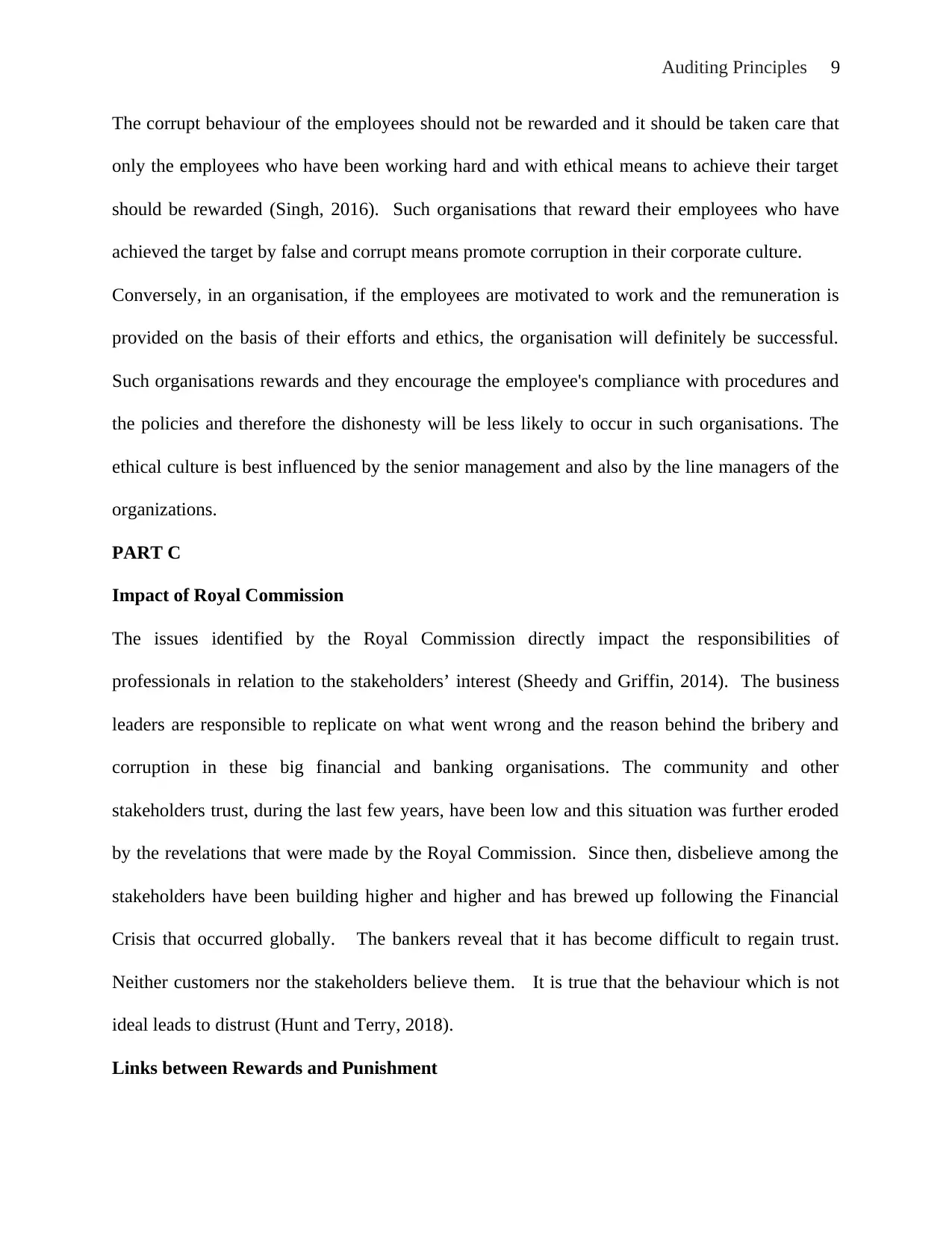
Auditing Principles 9
The corrupt behaviour of the employees should not be rewarded and it should be taken care that
only the employees who have been working hard and with ethical means to achieve their target
should be rewarded (Singh, 2016). Such organisations that reward their employees who have
achieved the target by false and corrupt means promote corruption in their corporate culture.
Conversely, in an organisation, if the employees are motivated to work and the remuneration is
provided on the basis of their efforts and ethics, the organisation will definitely be successful.
Such organisations rewards and they encourage the employee's compliance with procedures and
the policies and therefore the dishonesty will be less likely to occur in such organisations. The
ethical culture is best influenced by the senior management and also by the line managers of the
organizations.
PART C
Impact of Royal Commission
The issues identified by the Royal Commission directly impact the responsibilities of
professionals in relation to the stakeholders’ interest (Sheedy and Griffin, 2014). The business
leaders are responsible to replicate on what went wrong and the reason behind the bribery and
corruption in these big financial and banking organisations. The community and other
stakeholders trust, during the last few years, have been low and this situation was further eroded
by the revelations that were made by the Royal Commission. Since then, disbelieve among the
stakeholders have been building higher and higher and has brewed up following the Financial
Crisis that occurred globally. The bankers reveal that it has become difficult to regain trust.
Neither customers nor the stakeholders believe them. It is true that the behaviour which is not
ideal leads to distrust (Hunt and Terry, 2018).
Links between Rewards and Punishment
The corrupt behaviour of the employees should not be rewarded and it should be taken care that
only the employees who have been working hard and with ethical means to achieve their target
should be rewarded (Singh, 2016). Such organisations that reward their employees who have
achieved the target by false and corrupt means promote corruption in their corporate culture.
Conversely, in an organisation, if the employees are motivated to work and the remuneration is
provided on the basis of their efforts and ethics, the organisation will definitely be successful.
Such organisations rewards and they encourage the employee's compliance with procedures and
the policies and therefore the dishonesty will be less likely to occur in such organisations. The
ethical culture is best influenced by the senior management and also by the line managers of the
organizations.
PART C
Impact of Royal Commission
The issues identified by the Royal Commission directly impact the responsibilities of
professionals in relation to the stakeholders’ interest (Sheedy and Griffin, 2014). The business
leaders are responsible to replicate on what went wrong and the reason behind the bribery and
corruption in these big financial and banking organisations. The community and other
stakeholders trust, during the last few years, have been low and this situation was further eroded
by the revelations that were made by the Royal Commission. Since then, disbelieve among the
stakeholders have been building higher and higher and has brewed up following the Financial
Crisis that occurred globally. The bankers reveal that it has become difficult to regain trust.
Neither customers nor the stakeholders believe them. It is true that the behaviour which is not
ideal leads to distrust (Hunt and Terry, 2018).
Links between Rewards and Punishment
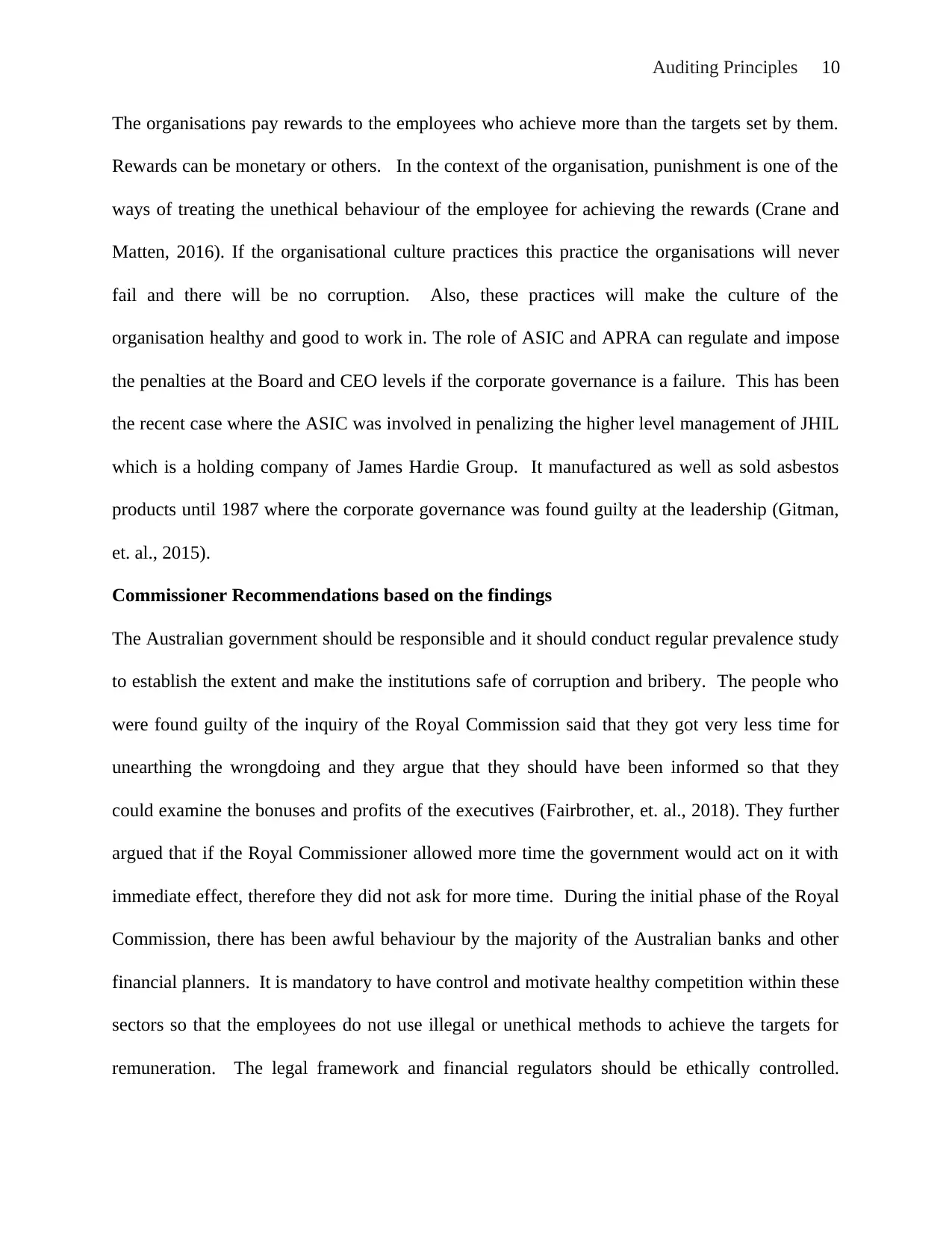
Auditing Principles 10
The organisations pay rewards to the employees who achieve more than the targets set by them.
Rewards can be monetary or others. In the context of the organisation, punishment is one of the
ways of treating the unethical behaviour of the employee for achieving the rewards (Crane and
Matten, 2016). If the organisational culture practices this practice the organisations will never
fail and there will be no corruption. Also, these practices will make the culture of the
organisation healthy and good to work in. The role of ASIC and APRA can regulate and impose
the penalties at the Board and CEO levels if the corporate governance is a failure. This has been
the recent case where the ASIC was involved in penalizing the higher level management of JHIL
which is a holding company of James Hardie Group. It manufactured as well as sold asbestos
products until 1987 where the corporate governance was found guilty at the leadership (Gitman,
et. al., 2015).
Commissioner Recommendations based on the findings
The Australian government should be responsible and it should conduct regular prevalence study
to establish the extent and make the institutions safe of corruption and bribery. The people who
were found guilty of the inquiry of the Royal Commission said that they got very less time for
unearthing the wrongdoing and they argue that they should have been informed so that they
could examine the bonuses and profits of the executives (Fairbrother, et. al., 2018). They further
argued that if the Royal Commissioner allowed more time the government would act on it with
immediate effect, therefore they did not ask for more time. During the initial phase of the Royal
Commission, there has been awful behaviour by the majority of the Australian banks and other
financial planners. It is mandatory to have control and motivate healthy competition within these
sectors so that the employees do not use illegal or unethical methods to achieve the targets for
remuneration. The legal framework and financial regulators should be ethically controlled.
The organisations pay rewards to the employees who achieve more than the targets set by them.
Rewards can be monetary or others. In the context of the organisation, punishment is one of the
ways of treating the unethical behaviour of the employee for achieving the rewards (Crane and
Matten, 2016). If the organisational culture practices this practice the organisations will never
fail and there will be no corruption. Also, these practices will make the culture of the
organisation healthy and good to work in. The role of ASIC and APRA can regulate and impose
the penalties at the Board and CEO levels if the corporate governance is a failure. This has been
the recent case where the ASIC was involved in penalizing the higher level management of JHIL
which is a holding company of James Hardie Group. It manufactured as well as sold asbestos
products until 1987 where the corporate governance was found guilty at the leadership (Gitman,
et. al., 2015).
Commissioner Recommendations based on the findings
The Australian government should be responsible and it should conduct regular prevalence study
to establish the extent and make the institutions safe of corruption and bribery. The people who
were found guilty of the inquiry of the Royal Commission said that they got very less time for
unearthing the wrongdoing and they argue that they should have been informed so that they
could examine the bonuses and profits of the executives (Fairbrother, et. al., 2018). They further
argued that if the Royal Commissioner allowed more time the government would act on it with
immediate effect, therefore they did not ask for more time. During the initial phase of the Royal
Commission, there has been awful behaviour by the majority of the Australian banks and other
financial planners. It is mandatory to have control and motivate healthy competition within these
sectors so that the employees do not use illegal or unethical methods to achieve the targets for
remuneration. The legal framework and financial regulators should be ethically controlled.
Secure Best Marks with AI Grader
Need help grading? Try our AI Grader for instant feedback on your assignments.
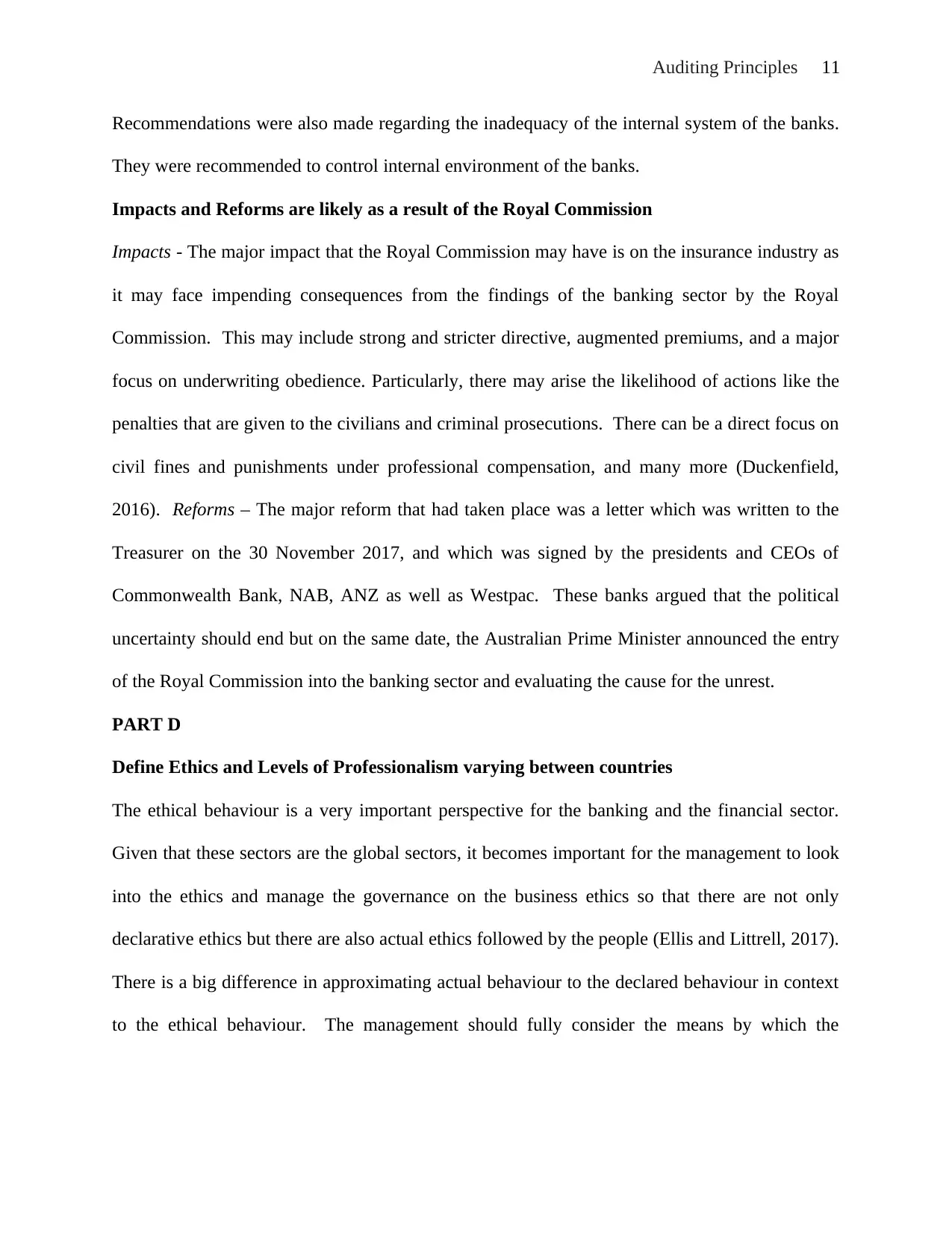
Auditing Principles 11
Recommendations were also made regarding the inadequacy of the internal system of the banks.
They were recommended to control internal environment of the banks.
Impacts and Reforms are likely as a result of the Royal Commission
Impacts - The major impact that the Royal Commission may have is on the insurance industry as
it may face impending consequences from the findings of the banking sector by the Royal
Commission. This may include strong and stricter directive, augmented premiums, and a major
focus on underwriting obedience. Particularly, there may arise the likelihood of actions like the
penalties that are given to the civilians and criminal prosecutions. There can be a direct focus on
civil fines and punishments under professional compensation, and many more (Duckenfield,
2016). Reforms – The major reform that had taken place was a letter which was written to the
Treasurer on the 30 November 2017, and which was signed by the presidents and CEOs of
Commonwealth Bank, NAB, ANZ as well as Westpac. These banks argued that the political
uncertainty should end but on the same date, the Australian Prime Minister announced the entry
of the Royal Commission into the banking sector and evaluating the cause for the unrest.
PART D
Define Ethics and Levels of Professionalism varying between countries
The ethical behaviour is a very important perspective for the banking and the financial sector.
Given that these sectors are the global sectors, it becomes important for the management to look
into the ethics and manage the governance on the business ethics so that there are not only
declarative ethics but there are also actual ethics followed by the people (Ellis and Littrell, 2017).
There is a big difference in approximating actual behaviour to the declared behaviour in context
to the ethical behaviour. The management should fully consider the means by which the
Recommendations were also made regarding the inadequacy of the internal system of the banks.
They were recommended to control internal environment of the banks.
Impacts and Reforms are likely as a result of the Royal Commission
Impacts - The major impact that the Royal Commission may have is on the insurance industry as
it may face impending consequences from the findings of the banking sector by the Royal
Commission. This may include strong and stricter directive, augmented premiums, and a major
focus on underwriting obedience. Particularly, there may arise the likelihood of actions like the
penalties that are given to the civilians and criminal prosecutions. There can be a direct focus on
civil fines and punishments under professional compensation, and many more (Duckenfield,
2016). Reforms – The major reform that had taken place was a letter which was written to the
Treasurer on the 30 November 2017, and which was signed by the presidents and CEOs of
Commonwealth Bank, NAB, ANZ as well as Westpac. These banks argued that the political
uncertainty should end but on the same date, the Australian Prime Minister announced the entry
of the Royal Commission into the banking sector and evaluating the cause for the unrest.
PART D
Define Ethics and Levels of Professionalism varying between countries
The ethical behaviour is a very important perspective for the banking and the financial sector.
Given that these sectors are the global sectors, it becomes important for the management to look
into the ethics and manage the governance on the business ethics so that there are not only
declarative ethics but there are also actual ethics followed by the people (Ellis and Littrell, 2017).
There is a big difference in approximating actual behaviour to the declared behaviour in context
to the ethical behaviour. The management should fully consider the means by which the
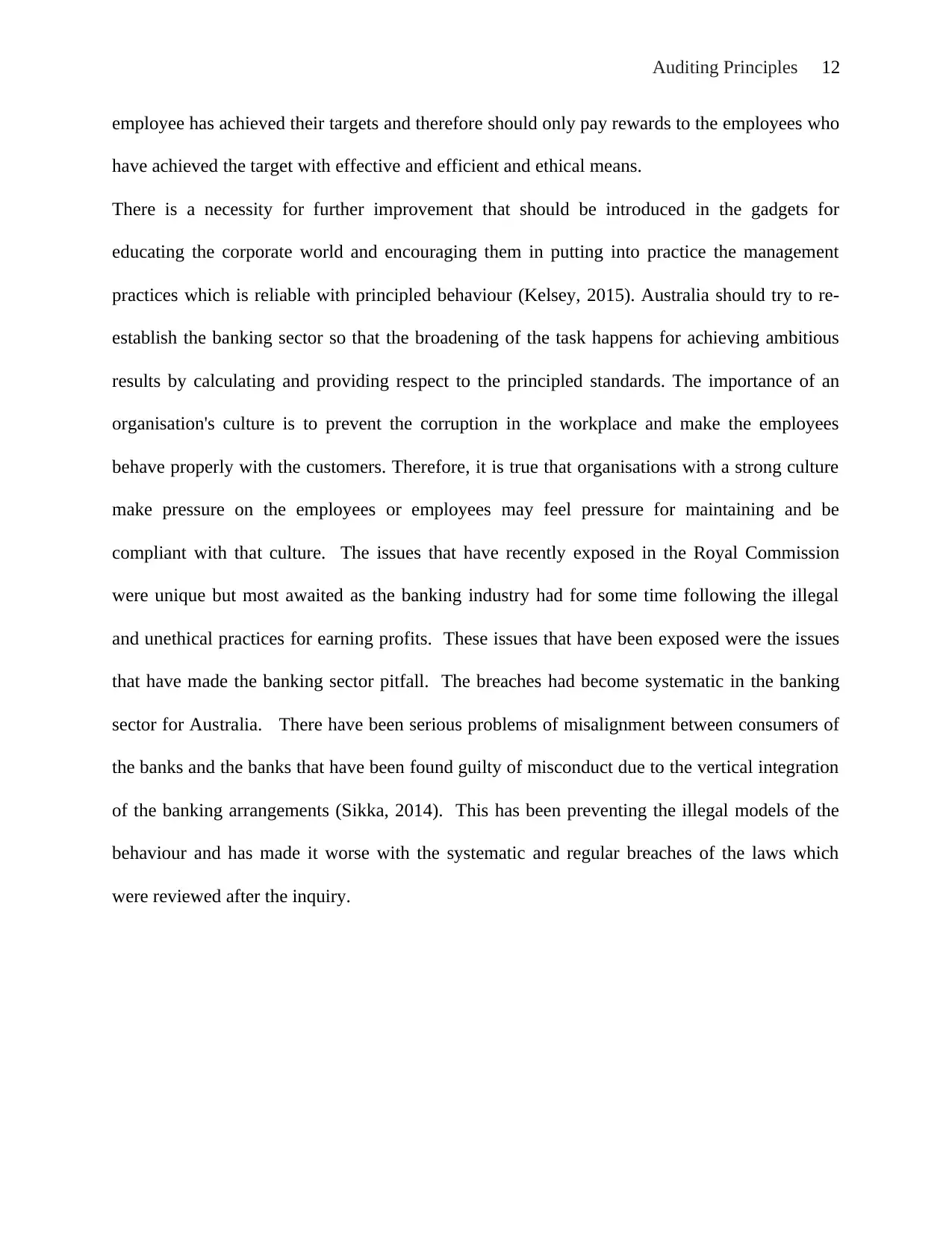
Auditing Principles 12
employee has achieved their targets and therefore should only pay rewards to the employees who
have achieved the target with effective and efficient and ethical means.
There is a necessity for further improvement that should be introduced in the gadgets for
educating the corporate world and encouraging them in putting into practice the management
practices which is reliable with principled behaviour (Kelsey, 2015). Australia should try to re-
establish the banking sector so that the broadening of the task happens for achieving ambitious
results by calculating and providing respect to the principled standards. The importance of an
organisation's culture is to prevent the corruption in the workplace and make the employees
behave properly with the customers. Therefore, it is true that organisations with a strong culture
make pressure on the employees or employees may feel pressure for maintaining and be
compliant with that culture. The issues that have recently exposed in the Royal Commission
were unique but most awaited as the banking industry had for some time following the illegal
and unethical practices for earning profits. These issues that have been exposed were the issues
that have made the banking sector pitfall. The breaches had become systematic in the banking
sector for Australia. There have been serious problems of misalignment between consumers of
the banks and the banks that have been found guilty of misconduct due to the vertical integration
of the banking arrangements (Sikka, 2014). This has been preventing the illegal models of the
behaviour and has made it worse with the systematic and regular breaches of the laws which
were reviewed after the inquiry.
employee has achieved their targets and therefore should only pay rewards to the employees who
have achieved the target with effective and efficient and ethical means.
There is a necessity for further improvement that should be introduced in the gadgets for
educating the corporate world and encouraging them in putting into practice the management
practices which is reliable with principled behaviour (Kelsey, 2015). Australia should try to re-
establish the banking sector so that the broadening of the task happens for achieving ambitious
results by calculating and providing respect to the principled standards. The importance of an
organisation's culture is to prevent the corruption in the workplace and make the employees
behave properly with the customers. Therefore, it is true that organisations with a strong culture
make pressure on the employees or employees may feel pressure for maintaining and be
compliant with that culture. The issues that have recently exposed in the Royal Commission
were unique but most awaited as the banking industry had for some time following the illegal
and unethical practices for earning profits. These issues that have been exposed were the issues
that have made the banking sector pitfall. The breaches had become systematic in the banking
sector for Australia. There have been serious problems of misalignment between consumers of
the banks and the banks that have been found guilty of misconduct due to the vertical integration
of the banking arrangements (Sikka, 2014). This has been preventing the illegal models of the
behaviour and has made it worse with the systematic and regular breaches of the laws which
were reviewed after the inquiry.
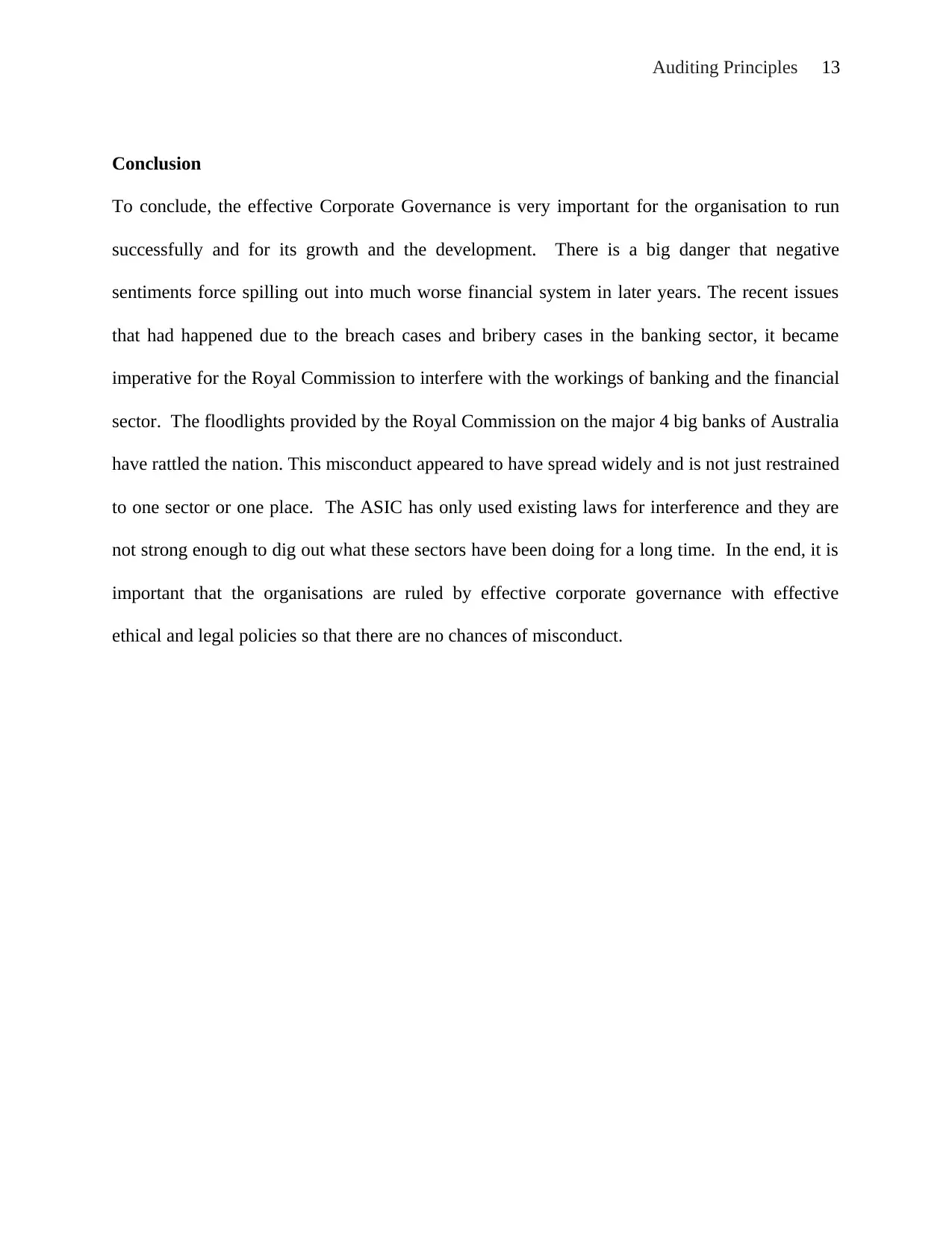
Auditing Principles 13
Conclusion
To conclude, the effective Corporate Governance is very important for the organisation to run
successfully and for its growth and the development. There is a big danger that negative
sentiments force spilling out into much worse financial system in later years. The recent issues
that had happened due to the breach cases and bribery cases in the banking sector, it became
imperative for the Royal Commission to interfere with the workings of banking and the financial
sector. The floodlights provided by the Royal Commission on the major 4 big banks of Australia
have rattled the nation. This misconduct appeared to have spread widely and is not just restrained
to one sector or one place. The ASIC has only used existing laws for interference and they are
not strong enough to dig out what these sectors have been doing for a long time. In the end, it is
important that the organisations are ruled by effective corporate governance with effective
ethical and legal policies so that there are no chances of misconduct.
Conclusion
To conclude, the effective Corporate Governance is very important for the organisation to run
successfully and for its growth and the development. There is a big danger that negative
sentiments force spilling out into much worse financial system in later years. The recent issues
that had happened due to the breach cases and bribery cases in the banking sector, it became
imperative for the Royal Commission to interfere with the workings of banking and the financial
sector. The floodlights provided by the Royal Commission on the major 4 big banks of Australia
have rattled the nation. This misconduct appeared to have spread widely and is not just restrained
to one sector or one place. The ASIC has only used existing laws for interference and they are
not strong enough to dig out what these sectors have been doing for a long time. In the end, it is
important that the organisations are ruled by effective corporate governance with effective
ethical and legal policies so that there are no chances of misconduct.
Paraphrase This Document
Need a fresh take? Get an instant paraphrase of this document with our AI Paraphraser
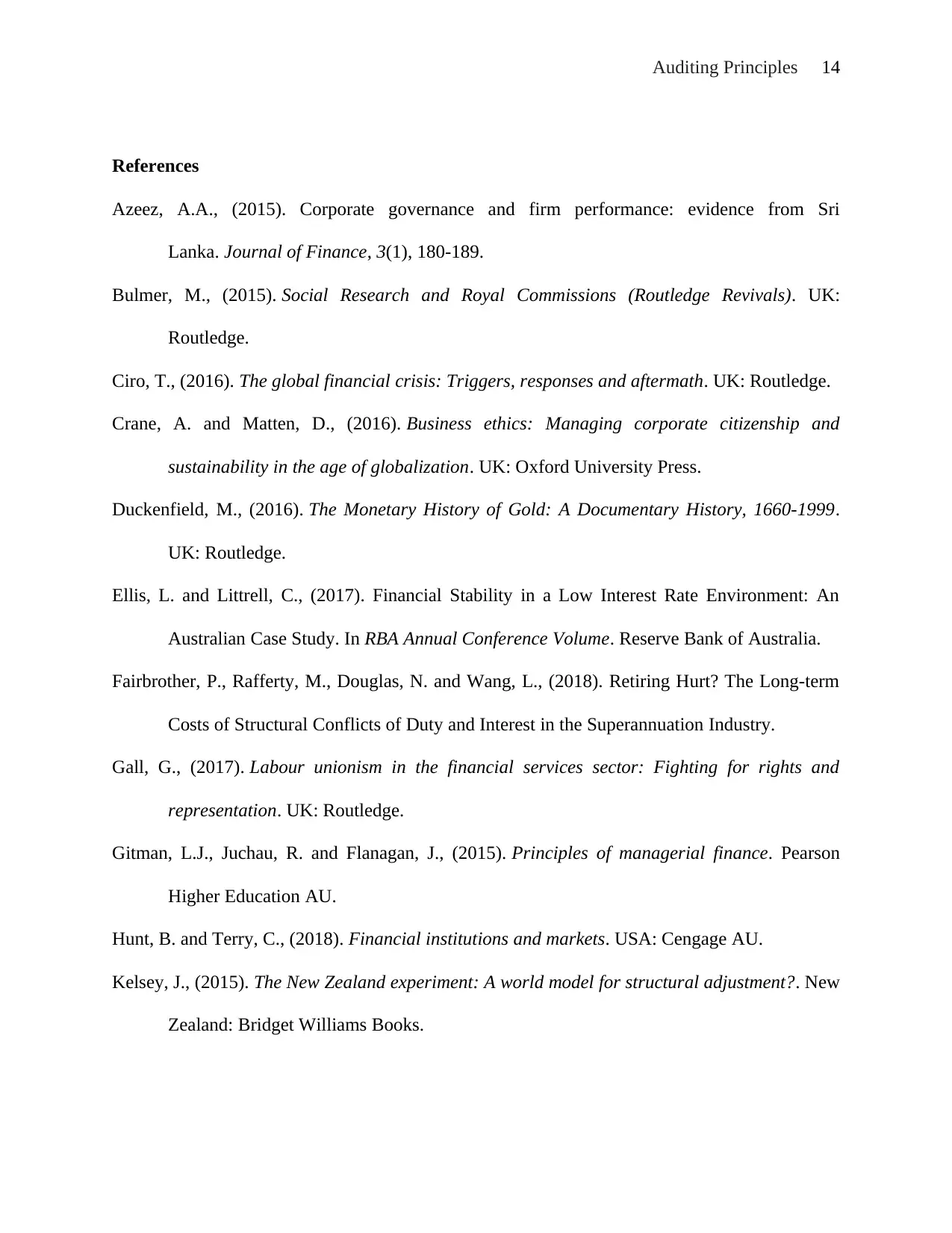
Auditing Principles 14
References
Azeez, A.A., (2015). Corporate governance and firm performance: evidence from Sri
Lanka. Journal of Finance, 3(1), 180-189.
Bulmer, M., (2015). Social Research and Royal Commissions (Routledge Revivals). UK:
Routledge.
Ciro, T., (2016). The global financial crisis: Triggers, responses and aftermath. UK: Routledge.
Crane, A. and Matten, D., (2016). Business ethics: Managing corporate citizenship and
sustainability in the age of globalization. UK: Oxford University Press.
Duckenfield, M., (2016). The Monetary History of Gold: A Documentary History, 1660-1999.
UK: Routledge.
Ellis, L. and Littrell, C., (2017). Financial Stability in a Low Interest Rate Environment: An
Australian Case Study. In RBA Annual Conference Volume. Reserve Bank of Australia.
Fairbrother, P., Rafferty, M., Douglas, N. and Wang, L., (2018). Retiring Hurt? The Long-term
Costs of Structural Conflicts of Duty and Interest in the Superannuation Industry.
Gall, G., (2017). Labour unionism in the financial services sector: Fighting for rights and
representation. UK: Routledge.
Gitman, L.J., Juchau, R. and Flanagan, J., (2015). Principles of managerial finance. Pearson
Higher Education AU.
Hunt, B. and Terry, C., (2018). Financial institutions and markets. USA: Cengage AU.
Kelsey, J., (2015). The New Zealand experiment: A world model for structural adjustment?. New
Zealand: Bridget Williams Books.
References
Azeez, A.A., (2015). Corporate governance and firm performance: evidence from Sri
Lanka. Journal of Finance, 3(1), 180-189.
Bulmer, M., (2015). Social Research and Royal Commissions (Routledge Revivals). UK:
Routledge.
Ciro, T., (2016). The global financial crisis: Triggers, responses and aftermath. UK: Routledge.
Crane, A. and Matten, D., (2016). Business ethics: Managing corporate citizenship and
sustainability in the age of globalization. UK: Oxford University Press.
Duckenfield, M., (2016). The Monetary History of Gold: A Documentary History, 1660-1999.
UK: Routledge.
Ellis, L. and Littrell, C., (2017). Financial Stability in a Low Interest Rate Environment: An
Australian Case Study. In RBA Annual Conference Volume. Reserve Bank of Australia.
Fairbrother, P., Rafferty, M., Douglas, N. and Wang, L., (2018). Retiring Hurt? The Long-term
Costs of Structural Conflicts of Duty and Interest in the Superannuation Industry.
Gall, G., (2017). Labour unionism in the financial services sector: Fighting for rights and
representation. UK: Routledge.
Gitman, L.J., Juchau, R. and Flanagan, J., (2015). Principles of managerial finance. Pearson
Higher Education AU.
Hunt, B. and Terry, C., (2018). Financial institutions and markets. USA: Cengage AU.
Kelsey, J., (2015). The New Zealand experiment: A world model for structural adjustment?. New
Zealand: Bridget Williams Books.
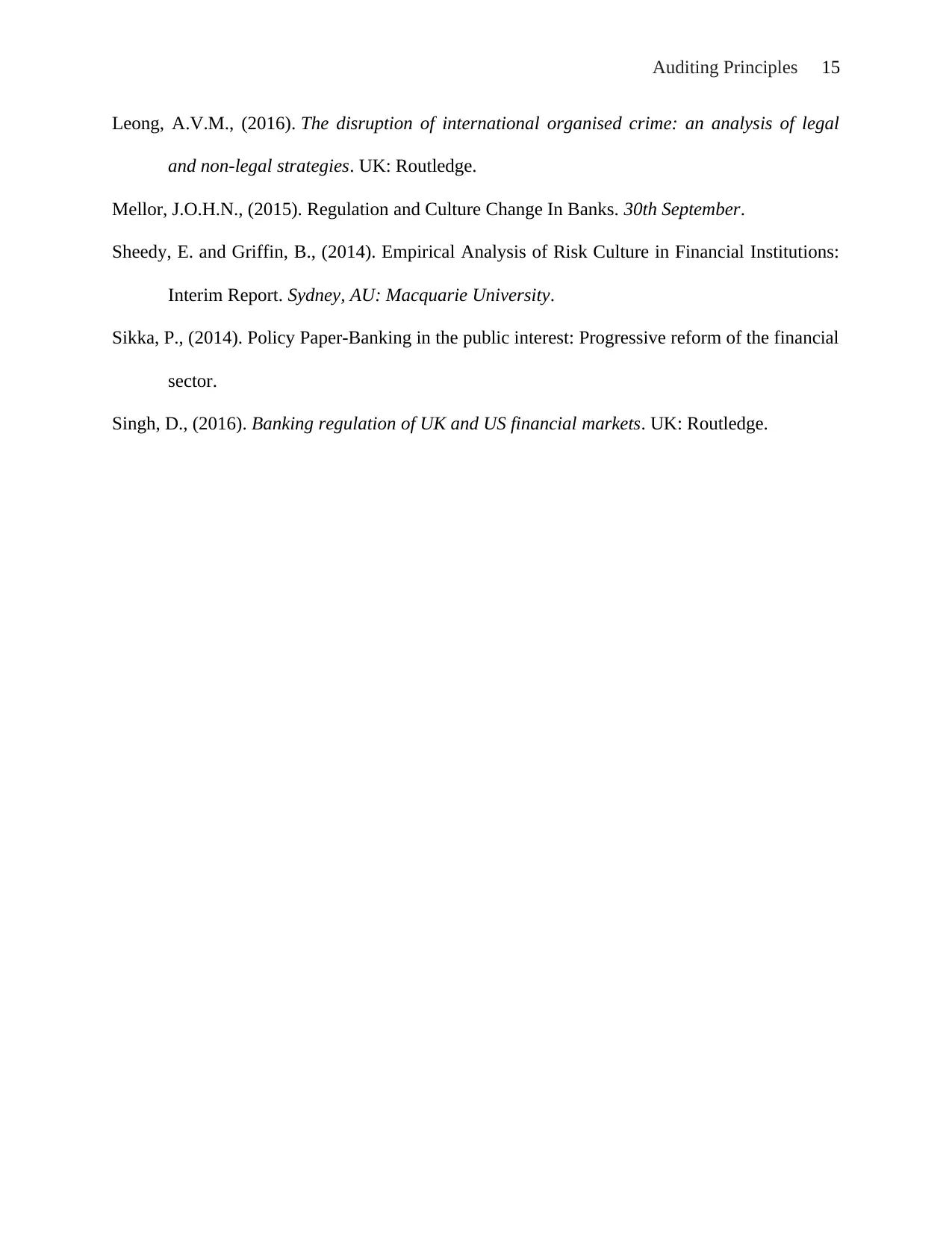
Auditing Principles 15
Leong, A.V.M., (2016). The disruption of international organised crime: an analysis of legal
and non-legal strategies. UK: Routledge.
Mellor, J.O.H.N., (2015). Regulation and Culture Change In Banks. 30th September.
Sheedy, E. and Griffin, B., (2014). Empirical Analysis of Risk Culture in Financial Institutions:
Interim Report. Sydney, AU: Macquarie University.
Sikka, P., (2014). Policy Paper-Banking in the public interest: Progressive reform of the financial
sector.
Singh, D., (2016). Banking regulation of UK and US financial markets. UK: Routledge.
Leong, A.V.M., (2016). The disruption of international organised crime: an analysis of legal
and non-legal strategies. UK: Routledge.
Mellor, J.O.H.N., (2015). Regulation and Culture Change In Banks. 30th September.
Sheedy, E. and Griffin, B., (2014). Empirical Analysis of Risk Culture in Financial Institutions:
Interim Report. Sydney, AU: Macquarie University.
Sikka, P., (2014). Policy Paper-Banking in the public interest: Progressive reform of the financial
sector.
Singh, D., (2016). Banking regulation of UK and US financial markets. UK: Routledge.

Auditing Principles 16
1 out of 16
Related Documents
Your All-in-One AI-Powered Toolkit for Academic Success.
+13062052269
info@desklib.com
Available 24*7 on WhatsApp / Email
![[object Object]](/_next/static/media/star-bottom.7253800d.svg)
Unlock your academic potential
© 2024 | Zucol Services PVT LTD | All rights reserved.





